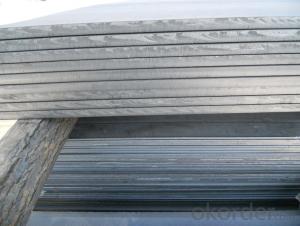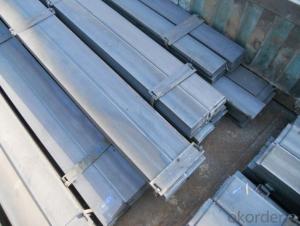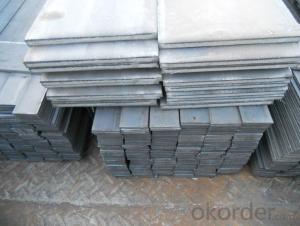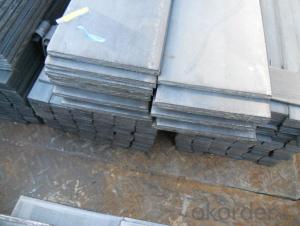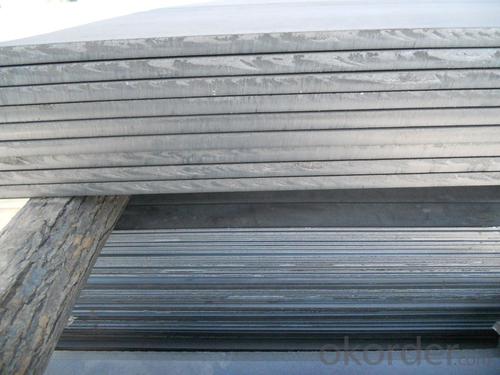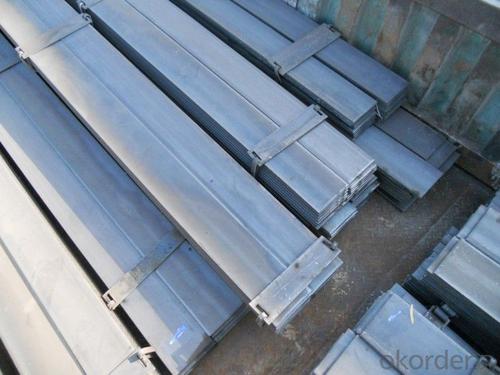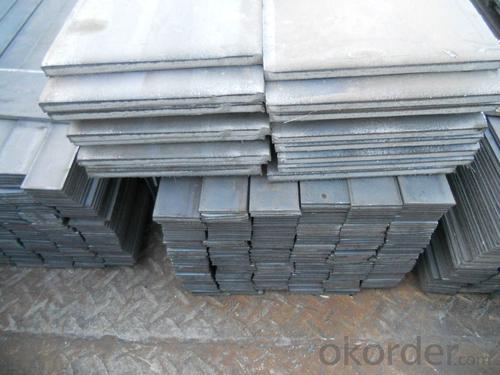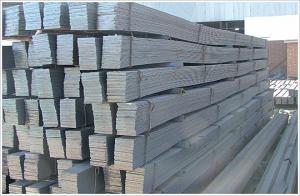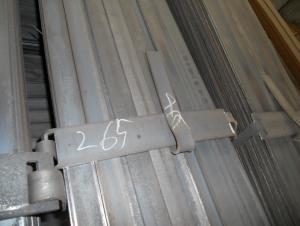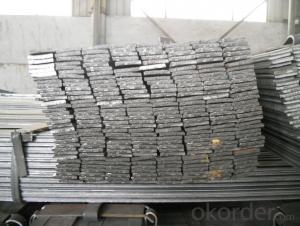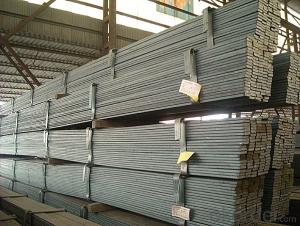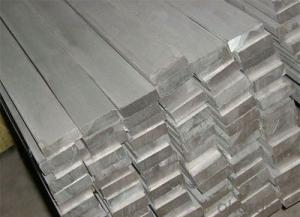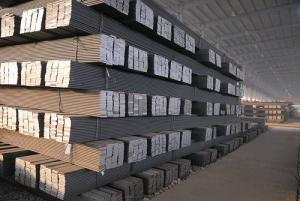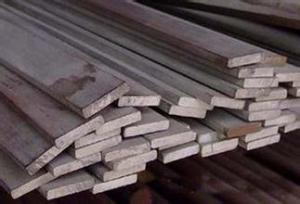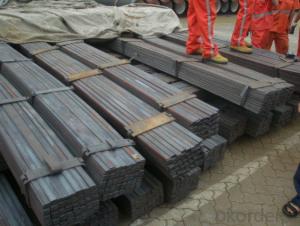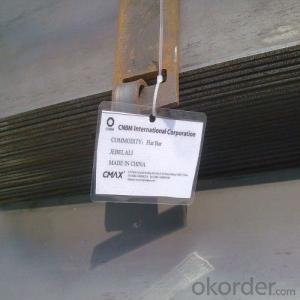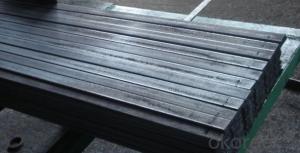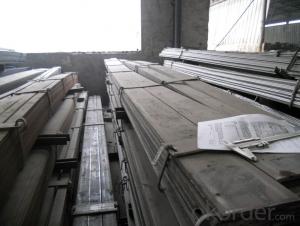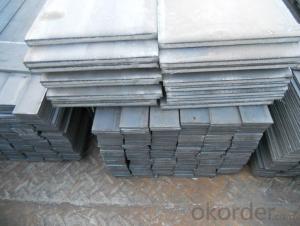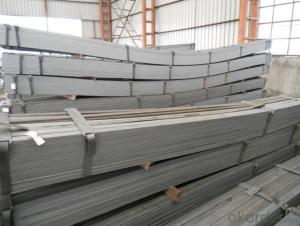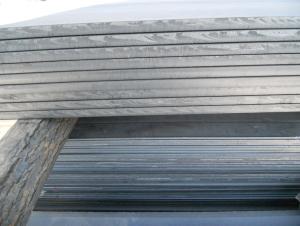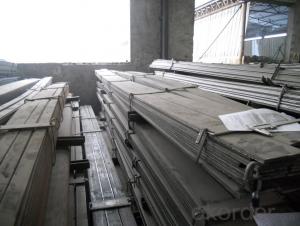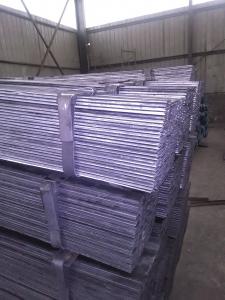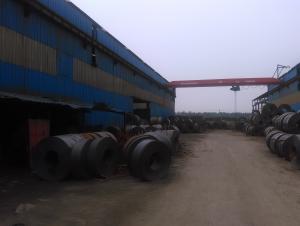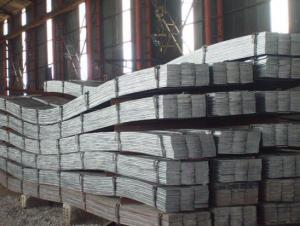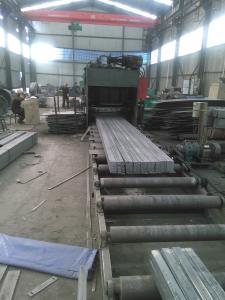Hot Rolled Seel Flat Bars with Material Grade Q235/SS400
- Loading Port:
- Tianjin
- Payment Terms:
- TT OR LC
- Min Order Qty:
- 25 m.t.
- Supply Capability:
- 10000 m.t./month
OKorder Service Pledge
OKorder Financial Service
You Might Also Like
Product Description:
OKorder is offering high quality Flat Bar at great prices with worldwide shipping. Our supplier is a world-class manufacturer of steel, with our products utilized the world over. OKorder annually supplies products to European, North American and Asian markets. We provide quotations within 24 hours of receiving an inquiry and guarantee competitive prices.
Product Applications:
Flat Bars are ideal for structural applications and are widely used in the construction of buildings and bridges, and the manufacturing, petrochemical, and transportation industries.
Product Advantages:
OKorder's Flats Barare durable, strong, and resist corrosion.
Main Product Features:
· Premium quality
· Prompt delivery & seaworthy packing (30 days after receiving deposit)
· Corrosion resistance
· Can be recycled and reused
· Mill test certification
· Professional Service
· Competitive pricing
Product Specifications:
Manufacture: Hot Rolled
Grade: Q195 – 235 ;SS400
Certificates: ISO, SGS, BV, CIQ
Length: 6m – 12m, as per customer request
Packaging: Export packing, nude packing, bundled
Chemical composition of Q235
Alloy No | Grade | Element(%) | ||||
C
| Mn
| S
| P
| Si
| ||
Q235
|
B
|
0.12—0.20 |
0.3—0.7 |
≤0.045 |
≤0.045
|
≤0.3
|
Physical properties of Q235
Alloy No | Grade | Yielding strength point(Mpa) | Tensile strength (Mpa) | Elongation after fracture(%) | ||||||
Thickness (mm) | Thickness (mm) | |||||||||
≤16 | >16--40 | >40--60 | >60--100 | ≤16 | >16--40 | >40--60 | >60--100 | |||
≥ | ≥ | |||||||||
Q235 |
B |
235 |
225 |
215 |
205 |
375--500 |
26 |
25 |
24 |
23 |
FAQ:
Q1: How soon can we receive the product after purchase?
A1: Within three days of placing an order, we will begin production. The specific shipping date is dependent upon international and government factors, but is typically 7 to 10 workdays.
Q2: How do we guarantee the quality of our products?
A2: We have established an advanced quality management system which conducts strict quality tests at every step, from raw materials to the final product.
Q3: The products are invoicing on theoritical weight or on actual weight basis ?
A3: We can do it in both manners, according to buyers' requirement.
Q4: What is the normal tolerance of your falt bars ?
A4: Normally 7%-9%, but we can also produce the goods according to the customers' requests.
Images:
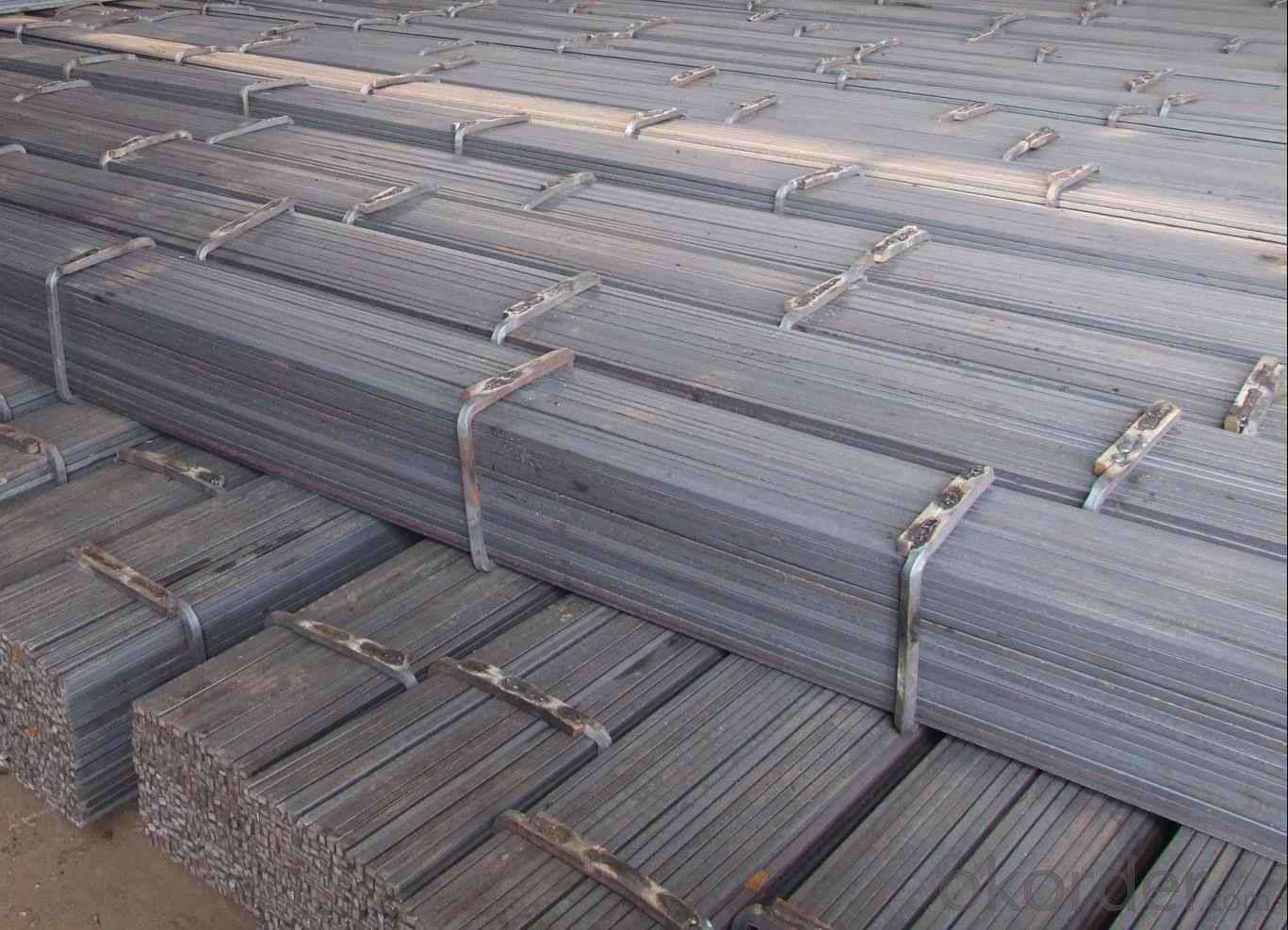
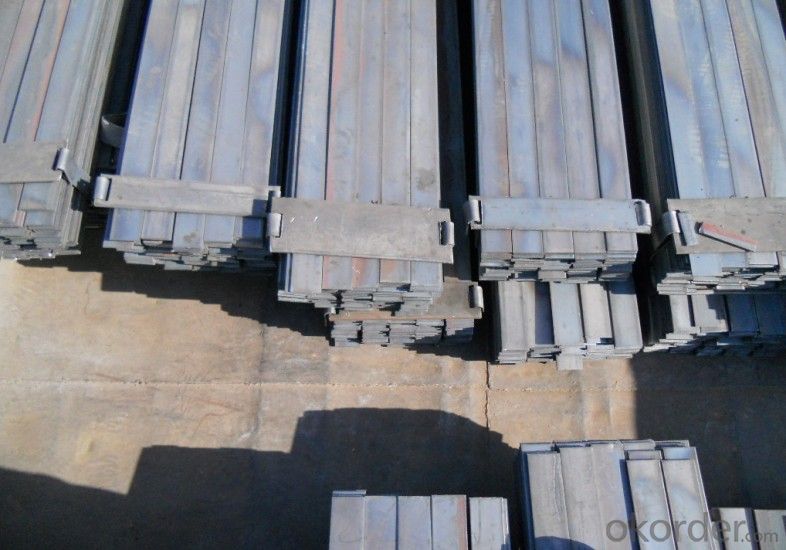
- Q: Can steel flat bars be used for manufacturing aerospace components?
- Indeed, aerospace components can be manufactured using steel flat bars. Steel, known for its exceptional strength, durability, and corrosion resistance, holds a prominent position in the aerospace manufacturing realm. With the added advantage of easy machinability and versatility in shape and size, steel flat bars prove ideal for crafting diverse aerospace components, including brackets, supports, frames, and structural elements. Moreover, their employment guarantees the necessary strength and stability indispensable in aerospace applications, guaranteeing the safety and reliability of the resulting components.
- Q: How strong are steel flat bars?
- Steel flat bars are known for their strength and durability. The specific strength of steel flat bars can vary depending on the grade of steel used and the dimensions of the bar. However, in general, steel flat bars are considered to be quite strong due to the inherent properties of steel, making them suitable for a wide range of structural and industrial applications.
- Q: What line is the LEB line, please? Is it wire or flat steel or galvanized round bar?
- General requirements of the building's outdoor metal doors and windows, equipment shell, distribution box, etc., are required to do a second potential connection,It has not seen the specific technical requirements, we can use the past construction experience, building floor steel ring, Liang Gangjin, reinforced connecting line, equipment shell available 6 mm galvanized welded steel garden.
- Q: What are the different standards or specifications for steel flat bars?
- There are several different standards and specifications for steel flat bars, which outline the specific requirements and characteristics of these products. Some of the most commonly used standards include: 1. ASTM A36/A36M: This standard covers carbon structural steel shapes, plates, and bars of structural quality for use in riveted, bolted, or welded construction of bridges, buildings, and general structural purposes. It specifies the chemical composition, mechanical properties, and various other requirements for steel flat bars. 2. ASTM A572/A572M: This standard covers high-strength low-alloy columbium-vanadium structural steel shapes, plates, sheet piling, and bars for applications in bolted, welded, and riveted structures. It specifies the chemical composition, mechanical properties, and other relevant characteristics for steel flat bars. 3. ASTM A1011/A1011M: This standard covers hot-rolled carbon steel sheets, strips, and bars for general applications. It includes specifications for steel flat bars, including the chemical composition, mechanical properties, and other relevant requirements. 4. JIS G3101: This Japanese standard specifies the general requirements for hot-rolled steel plates, sheets, and strips used in general structural applications. It provides guidelines for steel flat bars, including the chemical composition, mechanical properties, and other important specifications. 5. EN 10025: This European standard specifies the technical delivery conditions for structural steel products, including steel flat bars. It outlines the requirements for steel grades, chemical composition, mechanical properties, and other relevant characteristics. These are just a few examples of the numerous standards and specifications available for steel flat bars. The choice of standard depends on the specific application and requirements of the project, ensuring that the steel flat bars meet the desired quality and performance standards.
- Q: How do you store steel flat bars to prevent damage?
- To prevent damage to steel flat bars, it is recommended to store them in a dry and well-ventilated area to avoid moisture buildup and corrosion. Additionally, they should be stacked horizontally with proper support to prevent bending or warping. Using protective covers or separating each bar with wooden or rubber spacers can prevent scratching or damage from contact with other materials. Regular inspection and maintenance are also essential to ensure their longevity and quality.
- Q: What's the difference between stainless steel flat bar 304 and 316?
- From the metallography point of view, because the stainless steel contains chromium, the surface forms a very thin chromium film, which separates from the oxygen penetrated by the steel.
- Q: What are the benefits of using steel flat bars in architectural projects?
- There are several benefits to using steel flat bars in architectural projects. Firstly, steel flat bars are known for their strength and durability. Steel is a robust material that can withstand heavy loads and extreme weather conditions, making it ideal for structural applications in buildings. This strength allows architects to design structures with larger spans and open spaces, providing more flexibility in their designs. Secondly, steel flat bars offer excellent corrosion resistance. Steel is often coated with protective layers such as galvanization or powder coating, which further enhances its ability to resist rust and corrosion. This is particularly important in architectural projects, where the structures are constantly exposed to the elements. The corrosion resistance of steel flat bars ensures the longevity and maintenance-free nature of the architectural project. Another advantage of using steel flat bars is their versatility in design. Steel can be easily manipulated and fabricated into various shapes and sizes, allowing architects to create unique and intricate designs. Steel flat bars can be cut, bent, and welded to fit specific project requirements, providing endless possibilities for creativity in architectural projects. Additionally, steel flat bars offer cost-effectiveness. Steel is a readily available material and its production processes have been streamlined over the years, making it a cost-effective option for architectural projects. The durability and maintenance-free nature of steel also contribute to long-term cost savings, as the structures will require minimal repairs and replacements over their lifespan. Lastly, steel flat bars are environmentally friendly. Steel is a highly recyclable material, and using steel flat bars in architectural projects reduces the need for new raw materials. Recycling steel reduces energy consumption and greenhouse gas emissions, making it a sustainable choice for architects and developers. In conclusion, the benefits of using steel flat bars in architectural projects include their strength, durability, corrosion resistance, versatility in design, cost-effectiveness, and environmental friendliness. Incorporating steel flat bars in architectural designs not only provides structural integrity but also allows for unique and creative designs that will stand the test of time.
- Q: What is the maximum load capacity of a steel flat bar?
- The maximum load capacity of a steel flat bar depends on various factors such as the dimensions of the bar, the quality and grade of the steel, and the method of load application. Generally, steel flat bars are designed to withstand significant loads due to their high tensile strength and durability. However, it is important to consult the manufacturer's specifications or perform structural calculations to determine the exact maximum load capacity for a specific steel flat bar.
- Q: Can steel flat bars be used for window frames?
- Yes, steel flat bars can be used for window frames. Steel flat bars have excellent strength and durability properties, making them suitable for various structural applications, including window frames. They provide a solid and sturdy framework for holding window panes in place. Additionally, steel flat bars can be easily fabricated and welded to create custom window frame designs. Their resistance to corrosion also ensures long-term performance and minimal maintenance requirements. Overall, steel flat bars offer a reliable and robust option for window frame construction.
- Q: 80 * 80 * 4 galvanized flat steel is what specifications?
- Galvanized square pipe.Specification: 80 * 80 * 4 is the dimension of galvanized square pipe. That is to say, the length and width of the inner diameter of the nozzle are 80mm, and the thickness of the tube wall is 4mm.
Send your message to us
Hot Rolled Seel Flat Bars with Material Grade Q235/SS400
- Loading Port:
- Tianjin
- Payment Terms:
- TT OR LC
- Min Order Qty:
- 25 m.t.
- Supply Capability:
- 10000 m.t./month
OKorder Service Pledge
OKorder Financial Service
Similar products
Hot products
Hot Searches
Related keywords
